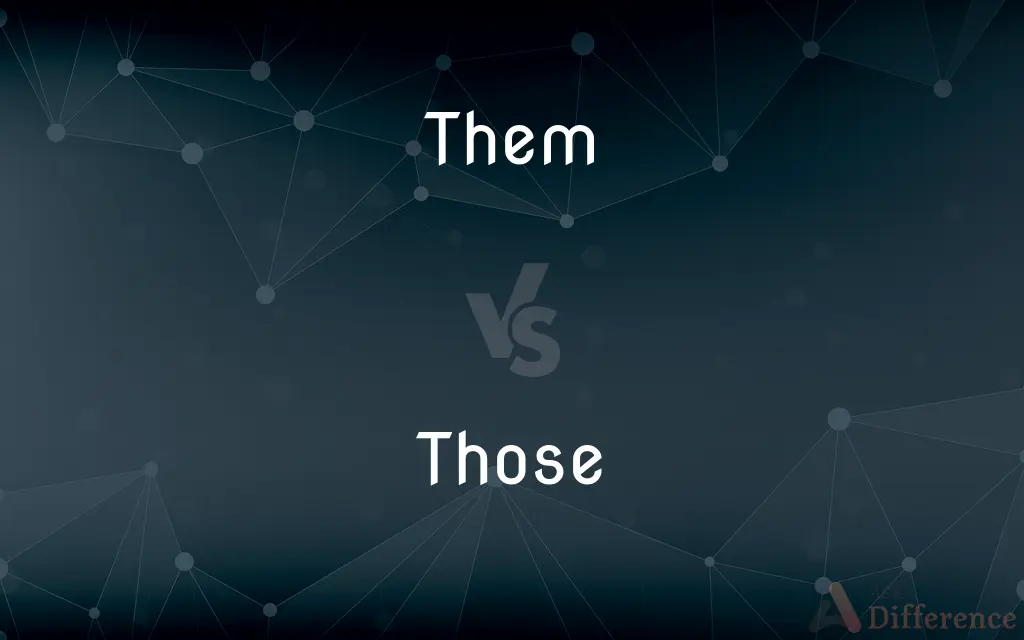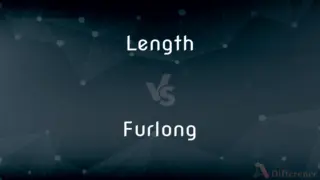Them vs. Those — What's the Difference?
By Tayyaba Rehman — Updated on November 5, 2023
'Them' is a pronoun referring to a group of people or things previously mentioned. 'Those' is a demonstrative pronoun specifying certain people or things over there.

Difference Between Them and Those
Table of Contents
ADVERTISEMENT
Key Differences
Them is a third-person plural pronoun used to refer to a group of people, animals, or things that have already been mentioned or are clearly understood from context. It is used as an object pronoun following a verb or preposition. Those, on the other hand, is a demonstrative pronoun used to identify specific items or people that are distant from the speaker, both in physical distance or metaphorically in time.
Those distinguishes itself by modifying nouns and indicating specific items among a larger group, often paired with a gesture or an indicator of position or time for clarification. Them does not modify nouns but rather replaces the noun phrase entirely once the context has been established. It's more general and doesn't imply distance or specificity.
While them is invariant, meaning it does not change form, those is the plural form of 'that' and changes based on number; 'that' for singular and 'those' for plural. Them refers to the object of the action, but those acts like an adjective, qualifying and specifying the noun it precedes.
Them is purely a pronoun, whereas those can also function as a determiner. When using those, there is an inherent contrast being made between what is near (these) and what is far (those), while them simply refers to the previously mentioned objects or subjects without such spatial or temporal implications.
In summary, them is the object pronoun used for referring to previously identified entities, while those is a demonstrative pronoun that points out specific entities among others, emphasizing distance or distinction.
ADVERTISEMENT
Comparison Chart
Part of Speech
Pronoun (object)
Demonstrative pronoun/determiner
Function
Replaces a noun phrase
Modifies and points out a noun
Number
Plural
Plural (singular: that)
Implication
General reference
Specificity and distance
Usage
After the context is provided
To provide context and specify
Compare with Definitions
Them
Referring to people
Tell them the news.
Those
For emphasis
Those are exactly my thoughts!
Them
Referring to objects
Can you move them closer?
Those
Demonstrative, distant in place
Who are those people?
Them
As a replacement for a noun
We invited them, not him.
Those
Demonstrative, distant in time
Those were the days.
Them
Following a preposition
This gift is for them.
Those
Contrasting with 'these'
I prefer these to those.
Them
(in the plural) Those ones.
Those
Determiner for nouns
Those cookies look delicious.
Them
Used as the direct object of a verb.
She treated them for a cold.
Those
Plural of that
Those bolts go with these parts.
Them
Object pronoun, plural
I saw them at the park.
Those
Plural of that
Those who serve [those persons who serve]
Don't touch those [those objects over there]
Them
Those
"Them dogs will find the end of them footprints before ten o'clock" (William Faulkner).
Those
The plural of that. See That.
Them
Used as the indirect object of a verb.
She wrote them a letter.
Them
Used as the object of a preposition.
Give it to them.
Them
(in the singular) A single person, previously mentioned, especially if of unknown or non-binary gender.
Them
Used as the direct object of a verb.
If a student has an inappropriate question, whatever you do, do not berate them.
Them
Used as the indirect object of a verb.
If one of my patients calls, please bring them their dinner.
Them
Used as the object of a preposition.
If someone comes and asks for the ticket, just give it to them.
Them
(dialectal) Those.
Them
The objective case of they. See They.
Go ye rather to them that sell, and buy for yourselves.
Then shall the King say unto them on his right hand, Come, ye blessed of my Father.
Little stars may hide them when they list.
Common Curiosities
Can 'them' be used for two people?
Yes, 'them' can refer to any number of people more than one.
Can 'them' indicate a specific group?
Yes, but the group must be understood from the context.
Do 'them' and 'those' have the same plurality?
Yes, they both refer to plural items or people.
Is 'those' used for objects near the speaker?
No, 'those' is used for objects that are at a distance.
Can 'them' start a sentence?
No, because 'them' is an object pronoun, not a subject pronoun.
Is 'those' ever used in singular?
No, the singular form of 'those' is 'that.'
Can 'those' refer to time periods?
Yes, to indicate a past time (e.g., "Those were the days").
What can 'them' replace in a sentence?
It can replace any plural noun previously mentioned.
When should 'those' be used instead of 'that'?
When referring to more than one person or thing at a distance.
How do 'them' and 'those' differ in pointing out?
'Them' does not point out; 'those' is used to specify and point out.
Are 'them' and 'those' interchangeable?
No, they serve different grammatical functions.
Is 'them' formal or informal?
'Them' is neutral; can be used in both formal and informal contexts.
Can 'those' be used without a noun following it?
Yes, when the noun is understood (e.g., "I’ll take those.").
How do 'them' and 'these' differ from 'those'?
'Them' doesn't imply distance; 'these' is for items close by, unlike 'those.'
Can 'them' refer to abstract concepts?
Yes, if the concept is plural and has been previously mentioned.
Share Your Discovery

Previous Comparison
Length vs. Furlong
Next Comparison
Comedian vs. ComedienneAuthor Spotlight
Written by
Tayyaba RehmanTayyaba Rehman is a distinguished writer, currently serving as a primary contributor to askdifference.com. As a researcher in semantics and etymology, Tayyaba's passion for the complexity of languages and their distinctions has found a perfect home on the platform. Tayyaba delves into the intricacies of language, distinguishing between commonly confused words and phrases, thereby providing clarity for readers worldwide.
















































